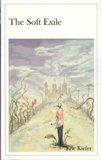Review of Eric Kiefer (Mongolia 2005-06) Novel The Soft Exile
 The Soft Exile
The Soft Exile
By Eric Kiefer (Mongolia 2005-06)
Gentleman Tree Publishing. $12.94
220 pages
2012
Reviewed by Lawrence F. Lihosit (Honduras, 1975-77)
Fans of a young Richard Brautigan (Confederate General in Big Sur) and J.D. Salinger (Catcher In the Rye) will appreciate this debut novel told in first-person. Like the former, there are mini-chapters and understated gallows humor. As is true with the latter, the book also includes cynicism by the privileged. It is also a very different fictional Peace Corps portrait than those written by pioneer volunteers years ago which leads to the question: how and why have we changed? For other aspiring Peace Corps volunteer novelists, take note. This is a commercially published book. Mr. Kiefer is among the elite ten percent of former volunteers who found a commercial publisher and I salute him. Hopefully, this is the first of many books that he will write.
In this confessional genre, a young man obsessed with signs of the apocalypse joins the Peace Corps based upon a suicide prevention worker’s telephone dare. The protagonist successfully completes training and is sent to a tiny village of 2,350 on the edge of the Gobi Desert to live in a tent, bathe in a river and burn dung for heat while trying to teach English to herders who might never travel more than one hundred miles in their entire life.
“The village looked like the set of an old Hollywood western…all meager and dilapidated. There was no cell phone reception and the closest internet connection was thirty-one miles east. There were three telephones: one in the post office, another in the bank and a third in a government building.” Electric power was prone to unexpected blackouts. The three main wells provided brackish water and “the ground surrounding the wells was perpetually littered with animal dung.”
The locals treat the protagonist well. “It was a weird and sad thing to be waited upon like I was some sort of foreign prince.” His tent (ger) had the luxury of a private outhouse and fairly stable electricity since it was connected directly to the post office. He is special, equipped with a sleeping bag, expensive guitar, emergency chlorine purification tablets, a carbon monoxide detector and a rape whistle.
Only one person in the village speaks halting English, his Mongolian female counterpart, Tsetseg. A middle-aged, married woman, she is one of the few who has left for an education and returned.
As time passes, the protagonist has changed in subtle ways. He begins “to notice the sound of sand particles grinding against each other in the wind.” He has begun to acclimatize. One day, he finds a transistor radio, buys it and spends hours walking alone, searching for airborne messages from the outside world. Atop a rise, he is surprised to receive a signal from China and an idea hatches: why not prepare a small radio station? He meets a strange Russian who is willing to sell a transmitter, antenna and microphone. During the discussion, the young volunteer admits that he does not yet have the money.
“You call again please, American friend…” says the Russian as he begins his retreat.
“How did you know that I’m American?”
“What other people shop with no money?”
Undeterred, he speaks with Tsetseg. Excited, she proposes that it be housed in the post office attic. However, they must first ask the local chieftain for permission. Well, the chieftain “chuckles to himself giddily” and agrees. The young American fills out forms and receives an international grant to purchase the equipment. He and Tsetseg paint the old attic and begin to equip the village’s first radio station. Once accomplished, the local chieftain steps in as the station manager which leads to the American’s mental breakdown.
Lawrence F. Lihosit is the author of several books about and/or inspired by Peace Corps service including Whispering Campaign; Stories from Mesoamerica (fiction). Years On and Other Travel Essays recently garnered the 2011 Peace Corps Writers Travel Book Award.
Kind of an abrupt ending to the review.
What can I say, buckaroo? Buy this book!
Thanks for the review and chance to talk, John and Larry! I’m glad to become another small part of the Peace Corps Worldwide crew… good times!
Eric Kiefer – http://www.thekiefer.com